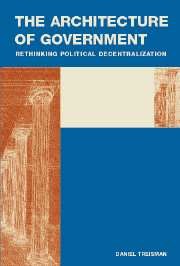Book contents
- Frontmatter
- Contents
- List of Figures and Tables
- Preface
- Glossary of Main Notation Used
- 1 INTRODUCTION
- 2 THE POLITICAL PROCESS
- 3 ADMINISTRATIVE EFFICIENCY
- 4 COMPETITION AMONG GOVERNMENTS
- 5 FISCAL POLICY AND REDISTRIBUTION
- 6 FISCAL COORDINATION AND INCENTIVES
- 7 CITIZENS AND GOVERNMENT
- 8 CHECKS, BALANCES, AND FREEDOM
- 9 ACQUIRING AND USING KNOWLEDGE
- 10 ETHNIC CONFLICT AND SECESSION
- 11 DATA TO THE RESCUE?
- 12 CONCLUSION: RETHINKING DECENTRALIZATION
- References
- Index
- Titles in the series
9 - ACQUIRING AND USING KNOWLEDGE
Published online by Cambridge University Press: 05 June 2012
- Frontmatter
- Contents
- List of Figures and Tables
- Preface
- Glossary of Main Notation Used
- 1 INTRODUCTION
- 2 THE POLITICAL PROCESS
- 3 ADMINISTRATIVE EFFICIENCY
- 4 COMPETITION AMONG GOVERNMENTS
- 5 FISCAL POLICY AND REDISTRIBUTION
- 6 FISCAL COORDINATION AND INCENTIVES
- 7 CITIZENS AND GOVERNMENT
- 8 CHECKS, BALANCES, AND FREEDOM
- 9 ACQUIRING AND USING KNOWLEDGE
- 10 ETHNIC CONFLICT AND SECESSION
- 11 DATA TO THE RESCUE?
- 12 CONCLUSION: RETHINKING DECENTRALIZATION
- References
- Index
- Titles in the series
Summary
Locally elected leaders know their constituents better than authorities at the national level and so should be well positioned to provide the public services local residents want and need.
The World Bank (1999, p. 108)I need not dwell on the deficiencies of the central authority in detailed knowledge of local persons and things … but in comprehension of the principles even of purely local management, the superiority of the central government, when rightly constituted, ought to be prodigious … the knowledge and experience of any local authority is but local knowledge and experience, confined to their own part of the country and its modes of management, whereas the central government has the means of knowing all that is to be learnt from the united experience of the whole kingdom, with the addition of easy access to that of foreign countries.
John Stuart Mill (1991 [1861], p. 423)Two common arguments concern how political decentralization affects the quality of the information on which policies are based. Some see in decentralization a means of incorporating into public decision making the “local knowledge” individuals glean from everyday experience. Others contend that decentralized political institutions stimulate policy experimentation. I consider both arguments in this chapter but find neither to be both general and convincing.
Information
To some of its advocates, the greatest virtue of decentralization is that it makes for policies that are informed by detailed and specific knowledge of local circumstances. Arguments to this effect come in three forms.
- Type
- Chapter
- Information
- The Architecture of GovernmentRethinking Political Decentralization, pp. 209 - 235Publisher: Cambridge University PressPrint publication year: 2007



